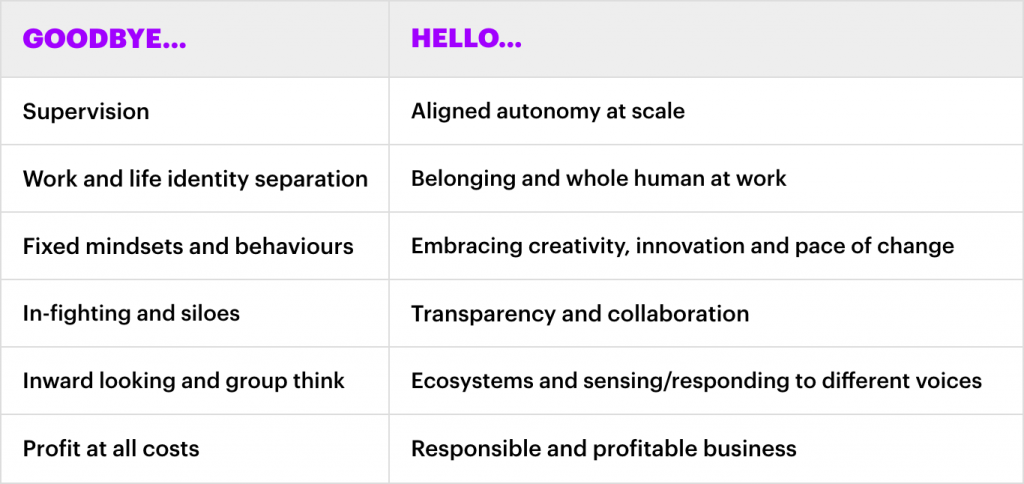Other parts of this series:
- How can you use crisis as a catalyst for change?
- Why change is hard (and what you can do about it)
- Unlock your people potential with behavioural science
- How to create people-driven change with science
- Five steps to managing change (and how to make it stick)
- What do high performing leaders get right?
Whether you’d planned it or not, your organisation is probably in the middle of a workforce transformation. Companies are grappling with how to support virtual workforces, spin up e-commerce capabilities, or take extra measures to ensure safe conditions for work that must be conducted in person.
I know these are challenging times for most people. Many of us are now juggling extra responsibilities—for example, I’ve also become headmaster of my children’s homeschool. (Let me just say, Albus Dumbledore made this look easy.)
A sudden disruption in behaviour
The COVID-19 pandemic has created a sudden disruption in behaviours on a scale never seen before. It’s shifting digital laggards online. Organisations are investing in solutions to help them make the shift, and individuals are learning new habits.
Here’s the thing: disruption is a challenge, but it’s also an opportunity. We have the opportunity to let go of old-school ways of working and embrace new behaviours that can empower people and unlock their potential.
For example, remote working has put certain behaviours into the spotlight.
 Many will not go back to how things were. And in my conversations with clients, one big idea keeps coming up: How can we use this as a catalyst for driving change?
Many will not go back to how things were. And in my conversations with clients, one big idea keeps coming up: How can we use this as a catalyst for driving change?
Trust matters (or, say what you do and do what you say)
In the academic literature, trust is defined as ‘the level of coherence experienced between actions and words’. In other words, you build trust by saying what you do and doing what you say.
The key dynamic behind team-level performance is what Harvard professor Amy Edmondson calls psychological safety. This is a group environment where people aren’t hindered by fear of each other. It creates a climate where people are comfortable being and expressing themselves. They can suggest new ideas, take reasonable risks, learn from valuable mistakes, and speak their minds, all without fear of being embarrassed or punished.
In order to contribute effectively, people must also feel like they belong. Do I feel included in discussions? Does my voice matter? Do people listen to me? As this article from Megan Reitz and John Higgins highlights, power dynamics within teams and organisations can make it difficult for people to speak up. They point out that even well-meaning statements like ‘my door is always open’ may actually discourage people from coming forward, because it conveys the power and status of a leader’s ability to have a door (whether literal or metaphorical) and choose to open it.
We need to hear diverse and dissenting voices, so we need to make it safe for people to raise them.
In other words, everyone must feel they can speak up. Given the pace of change, we’re all dealing with more unknowns than ever. We need to hear diverse and dissenting voices, so we need to make it safe for people to raise them. Otherwise, we risk creating organisational echo chambers that amplify blind spots.
Building trust on virtual teams
The large-scale shift to virtual teams raises two issues. First, virtual teams need to work harder than in-person teams to foster trust, psychological safety, and belonging. Second, if an organisation didn’t already have these qualities baked into its culture, the shift to work-from-home may be especially challenging.
The more open we are with each other, the more we trust each other—and so the cycle repeats. In some ways, the shift to virtual work has made this easier, as the lines between work and life identities blur. My children have made cameo appearances on many of my video calls, and I’ve seen my colleagues’ partners, children, and pets as well. These moments of humanity can be important for establishing and building trust within virtual teams.
Here’s another virtuous cycle for you: trust matters for collaboration, and collaboration builds trust. Another way of building trust, especially within remote teams, is through aligned autonomy. Aligned autonomy means empowering people with the autonomy they need to make decisions about their work, within reasonable and sensible constraints—so that team members are in sync and know what the proverbial right and left hand are doing.
Trust, collaboration, and aligned autonomy are all important for effective remote work.
When we work virtually, it can be easy for our networks and points of contact to narrow. It’s important to keep these channels open to ensure we’re being broad and inclusive.
When we’re in person, we parse all kinds of non-verbal signals to bring context to the interaction. It’s hard to replicate that information via video call, and that tends to create greater levels of hyper-sensitivity. For example, in person, there are natural gaps in conversation. On a video call, those gaps can seem much longer and cause concern. Is my internet connection slow, or does my colleague think my suggestion is terrible?
Left unchecked, the lack of face-to-face interaction can make it hard to establish the trust required for high performance. Making teams smaller is one tactic to increase trust among remote workers.
Leaders should consider the state of trust and psychological safety within their organisations before the COVID-19 pandemic hit—and what measures they’re prepared to take to support high trust moving forward.
Navigating changes today—and managing change tomorrow
What behaviours have you started and which ones would you like to continue? What old behaviours seem out of place and should be phased out?
You can use behavioural science to encourage behaviours that support high-trust and high-performance teams. This multidisciplinary, data-driven approach combines behavioural economics, psychology, and neuroscience with structured experiments and analytics. It helps us understand human biases and friction to change—and create a path that fuels new behaviours.
Over the past decade, the science of behaviour change has become an increasingly important tool for organisations. When used ethically and well, behavioural science can help you unlock the potential of your people.
Over the course of this blog series, I’ll look at how behavioural science can help organisations create and manage sustainable change—whether that change is planned or not. I’ll also talk about how behavioural science can help you adapt to the immediate challenges of the COVID-19 pandemic, and also leverage the current crisis as a catalyst for long-lasting change.
Watch for the next post in a week. Until then, I hope you and your loved ones are healthy and safe.
To find out more about how to apply behavioural science to create sustainable change in your organisation, please contact me here, or @andyyoungACN on Twitter.











